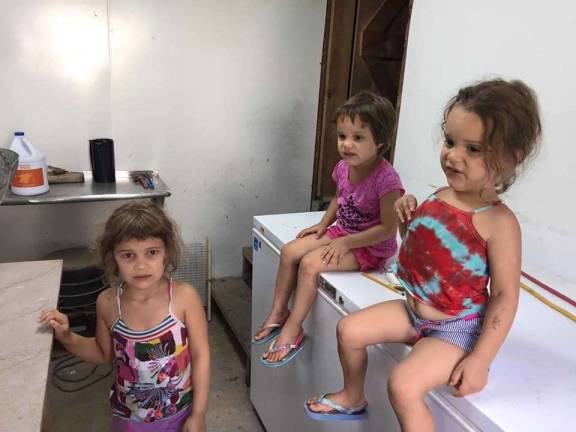Should kids experience animal slaughter?

A heavy, honorable lesson
Shopping in the grocery store is agony. When I look at beans, nuts, flour, rice, I don’t see food. I see farmers who can’t pay their bills and will never escape their debts. I see government subsidies that are corrupting our food supply. I see massive machinery burning unfathomable amounts of petroleum fuel, hundreds of thousands of acres of mono crop farmland eliminating ecosystems for wildlife, water pollution, soil depletion, underpaid laborers, shipping containers moving food across seas and continents, factory workers, and packaging. Oh, the packaging!
After the exhausting scrutiny and analyzing of each product, there is still nothing but guilt. It is not a satisfying process. I never experience that feeling when we slaughter an animal that we have raised and cared for. It’s emotional, yes. It should be. Compared, however, to shopping in the grocery store, it is a decision I can make with a clear conscious.
I feel humbled but also grateful and maybe even honorable. It feels right. I can take pride in a meal that I have raised in alignment with the respect and care that our Earth and its inhabitants deserve. Experiencing slaughter from this perspective, why would I not share that with my children?
My children are encouraged to participate as they see fit. They are welcome to actively participate, to observe, or to excuse themselves entirely. Even when the kids choose not to witness the slaughter, their curiosity usually gets the best of them. They peak from a distance or glance from the corner of their eye.
Slaughter never stops feeling heavy and even unpleasant but there is a point in the process in which there is a transformation from dead animal to meat and that is when everyone seems to gather around enthusiastically. The gut pile is a source of fascination, a hands on anatomy lesson. Skinning is usually where they get their first try at butchering. Breaking down a carcass and separating each muscle is an art and a skill.
I believe whole heartedly in teaching skills and crafts that lead to a self-sufficient and sustainable life.
Jesse Clark is a farmer and cheesemaker in Warwick, NY
An unnecessary trauma
Parents might want their children to know where meat comes from, but I don’t believe parents should intentionally take their children to witness animal slaughter. It can be traumatic for a young child. Moreover, I don’t believe it’s necessary; children seem to figure out the source of meat on their own.
Many parents have told me how their youngsters spontaneously started asking questions about the source of meat--before the parents engaged in any teaching. As one parent told me, her son pointed to a chicken on TV and asked, “Is that chicken the same as the chickens we eat?”
One of my college students, Alina Pavlakos, conducted a small study of what children know about meat-eating at different ages. Alina interviewed 28 urban, middle class children and found that most of the 5-year-olds didn’t know where meat comes from. They all knew they ate meat, but when asked, “Do you eat animals?,” most loudly exclaimed “Noooo,” as if the idea were outrageous. At the age of 7, all the children knew they ate animals. Allina’s study, while limited to one social group, suggests that children discover the source of meat fairly quickly and fairly early in life.
As Jane Goodall and Peter Singer have observed, when children discover they are eating animals they often become distraught and want to become vegetarians. But parents rarely allow it. They urge their children to eat meat and try to justify the practice. I wish adults would show greater respect for children’s concern for nonhuman animals and give children the freedom to make their own choices.
It is natural for us, as adults, to want to teach children. But this is an instance in which children can be our teachers. For when it comes to nonhuman animals, children have a concern and empathy that would be good for us to recapture.
Bill Crain is a professor of psychology at The City College of New York and co-founder of Safe Haven Farm Sanctuary in Poughquag, NY